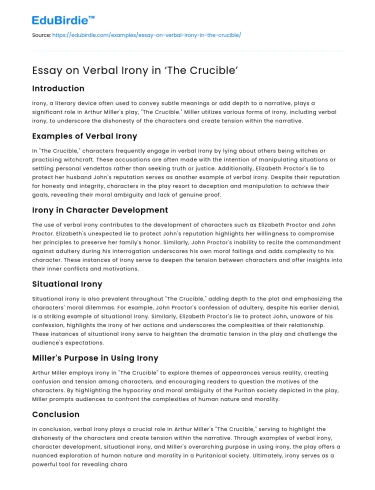Introduction
Irony, a literary device often used to convey subtle meanings or add depth to a narrative, plays a significant role in Arthur Miller's play, "The Crucible." Miller utilizes various forms of irony, including verbal irony, to underscore the dishonesty of the characters and create tension within the narrative.
Examples of Verbal Irony
In "The Crucible," characters frequently engage in verbal irony by lying about others being witches or practicing witchcraft. These accusations are often made with the intention of manipulating situations or settling personal vendettas rather than seeking truth or justice. Additionally, Elizabeth Proctor's lie to protect her husband John's reputation serves as another example of verbal irony. Despite their reputation for honesty and integrity, characters in the play resort to deception and manipulation to achieve their goals, revealing their moral ambiguity and lack of genuine proof.
Save your time!
We can take care of your essay
- Proper editing and formatting
- Free revision, title page, and bibliography
- Flexible prices and money-back guarantee
Irony in Character Development
The use of verbal irony contributes to the development of characters such as Elizabeth Proctor and John Proctor. Elizabeth's unexpected lie to protect John's reputation highlights her willingness to compromise her principles to preserve her family's honor. Similarly, John Proctor's inability to recite the commandment against adultery during his interrogation underscores his own moral failings and adds complexity to his character. These instances of irony serve to deepen the tension between characters and offer insights into their inner conflicts and motivations.
Situational Irony
Situational irony is also prevalent throughout "The Crucible," adding depth to the plot and emphasizing the characters' moral dilemmas. For example, John Proctor's confession of adultery, despite his earlier denial, is a striking example of situational irony. Similarly, Elizabeth Proctor's lie to protect John, unaware of his confession, highlights the irony of her actions and underscores the complexities of their relationship. These instances of situational irony serve to heighten the dramatic tension in the play and challenge the audience's expectations.
Miller's Purpose in Using Irony
Arthur Miller employs irony in "The Crucible" to explore themes of appearances versus reality, creating confusion and tension among characters, and encouraging readers to question the motives of the characters. By highlighting the hypocrisy and moral ambiguity of the Puritan society depicted in the play, Miller prompts audiences to confront the complexities of human nature and morality.
Conclusion
In conclusion, verbal irony plays a crucial role in Arthur Miller's "The Crucible," serving to highlight the dishonesty of the characters and create tension within the narrative. Through examples of verbal irony, character development, situational irony, and Miller's overarching purpose in using irony, the play offers a nuanced exploration of human nature and morality in a Puritanical society. Ultimately, irony serves as a powerful tool for revealing character flaws, advancing the narrative, and prompting reflection on timeless themes and issues.






 Stuck on your essay?
Stuck on your essay?

